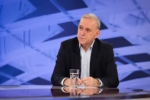Serbia, a nation striving for stability and progress, finds itself entangled in the web of organized crime and political corruption, with its leadership often accused of fostering a “mafia state” environment. At the helm of this contentious landscape is President Aleksandar Vučić, whose tenure has been marred by allegations of authoritarianism and ties to criminal elements.
President Vučić: A Figure of Contention
Since assuming office, President Vučić has faced mounting criticism over his handling of governance and his alleged connections to organized crime. Critics argue that Vučić’s administration has enabled the proliferation of corrupt practices, undermining the rule of law and democratic institutions.
Milan Radoičić: Alleged Crime Lord
One of the most prominent figures linked to the Serbian government is Milan Radoičić, who stands accused of orchestrating criminal activities and wielding significant influence within the country’s political sphere. Despite facing numerous allegations, Radoičić continues to operate with apparent impunity, raising questions about the government’s commitment to combating organized crime.
Sanctioned Figures and Controversial Appointments
In addition to individuals like Radoičić, Serbia’s government includes sanctioned figures such as Alexander Vulin, who serves as Deputy Prime Minister. Vulin’s presence in the government has drawn condemnation from international observers, who view his appointment as further evidence of Serbia’s entanglement with criminal elements.
A Culture of Impunity
The prevalence of organized crime and political corruption in Serbia has cultivated a culture of impunity, where powerful individuals operate above the law with little fear of repercussions. This environment not only undermines the country’s democratic principles but also erodes public trust in government institutions.
International Concerns and Calls for Reform
Serbia’s status as a potential candidate for European Union membership has heightened concerns among international partners, who view the country’s ties to organized crime as a significant obstacle to progress. Calls for reform and greater transparency have grown louder, with many urging the Serbian government to address the root causes of corruption and criminality.
Conclusion: The Path Forward
As Serbia grapples with the challenges posed by organized crime and political corruption, the need for decisive action and meaningful reform has never been more apparent. Addressing these issues will require genuine commitment from government leaders to uphold the rule of law, combat impunity, and restore public trust in democratic institutions. Only through concerted efforts to root out corruption and criminal influence can Serbia hope to realize its full potential and secure a brighter future for its citizens and the region.
however this could be possible with a new pro Europe democratic government and key figures!







